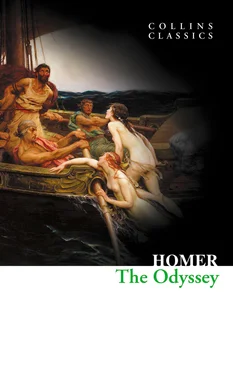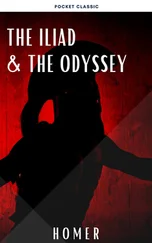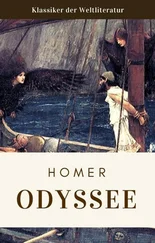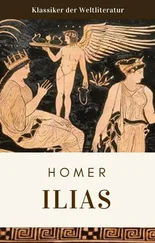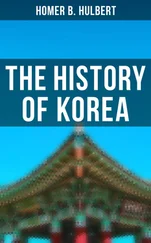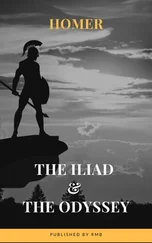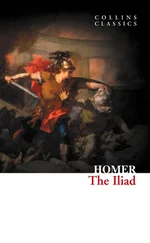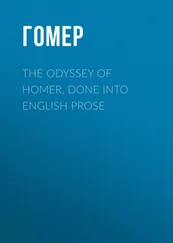Beneath them did Odysseus creep, and set to scraping together with his own hands a broad bed for himself: for inside there had drifted such pile of dry leaves as would have covered two or three men well enough for a winter-time, however hard the weather. When bold Odysseus saw the leaves he rejoiced and laid himself down in the midst of them and fell to pouring the litter by handfulls over his body, till he was covered: – even as a neighbourless man in a lonely steading, before he goes forth covers his charring log under black wood-cinders: and thus hoards all day against his return, a seed of flame, which otherwise he would have had to seek for himself from some other place. Just so did Odysseus lie while Athene shed down sleep upon his eyes, to shroud the dear eyelids and the sooner deliver him from the pains of his weakness.
BOOK 6 CONTENTS COVER TITLE PAGE THE ODYSSEY Homer BOOK 1 BOOK 2 BOOK 3 BOOK 4 BOOK 5 BOOK 6 BOOK 7 BOOK 8 BOOK 9 BOOK 10 BOOK 11 BOOK 12 BOOK 13 BOOK 14 BOOK 15 BOOK 16 BOOK 17 BOOK 18 BOOK 19 BOOK 20 BOOK 21 BOOK 22 BOOK 23 BOOK 24 CLASSIC LITERATURE: WORDS AND PHRASES ADAPTED FROM THE COLLINS ENGLISH DICTIONARY ABOUT THE AUTHOR OTHER WORKS TRANSLATOR’S NOTE HISTORY OF COLLINS COPYRIGHT ABOUT THE PUBLISHER
So at last long-suffering Odysseus yielded to his weariness and slept there; while Athene proceeded to the district and chief town of the Phaeacian people. These had formerly occupied broad lands in Hypereia near the Cyclopes, that race of rude bullies who, being brawnier than the Phaeacians, were wont to plunder them. Wherefore god-like Nausithous rose up and removed his people to Scheria beyond reach of the world’s covetousness. There he threw a wall around the new town-site and built houses and erected temples to the gods and apportioned the plough-lands.
Nausithous in due time yielded to fate, and went down to Hades: so now Alcinous reigned; wisely, for the gods prompted him. Therefore it was to his house that the goddess, grey-eyed Athene, descended to plan the reception of great-hearted Odysseus: and of his house she chose to enter the precious room where slept Nausicaa, daughter of royal Alcinous, a girl beautiful as an immortal in nature and form. Beside her, on each side of the entry, slept two hand-maidens whom the Graces had blessed with the gift of loveliness: and the gleaming doors were shut. Yet through them Athene swept like a sharp wind to the girl’s head. For the sake of her message the goddess had assumed the likeness of a playmate of Nausicaa’s own age and dear to her, the daughter of Dymas a famous sea captain. In this character then the grey-eyed Athene said: –
‘O Nausicaa, how careless has your mother’s daughter grown! These rich clothes all lie neglected, while your marriage season draws near: and that is the very time when you must clothe yourself rarely and have other things to give those who will take you in the bridal procession. By trifles like these is a good name won in the world, and fathers and mothers made proudly happy.
‘Therefore let us go washing to-morrow at the break of day: for I will lend you my aid, as fellow-worker, that you may be the sooner decked ready for that near time when you shall cease to be a maid. Do not the best lads of the Phaeacians, your kith and kin throughout the country-side, already ask your hand? So remember now to beg your father, first thing in the morning, to give you the mules and a waggon big enough to hold the men’s body-wrappers and your dresses and the glossy bed-covers. It will be better if you ride in it, too: for the washing pools are a very long foot-journey from the town.’
Having thus fulfilled her purpose Athene went away to Olympus where evermore they say the seat of the gods stays sure: for the winds shake it not, nor is it wetted by rain, nor approached by any snow. All around stretches the cloudless firmament, and a white glory of sunlight is diffused about its walls. There the blessed gods are happy all their days: and thither, accordingly, repaired the grey-eyed One after clearly imparting her message to the maiden.
High-throned Dawn came to rouse Nausicaa of the goodly robe. She, waking, wondered at her dream and went straight through the house to tell her dear father and mother. She found them within. Her mother sat by the hearth with her serving women, twirling on the distaff yarn which had been dipped in sea-purple dye: while her father she crossed in the doorway as he went out to consult with the illustrious princes of the people – a council to which the noblest of the Phaeacians had summoned them. She went near to this father she loved, that she might softly say: –
‘Dear Father, will you not let me have the deep easy-wheeled waggon, that I may take all the good soiled clothes that lie by me to the river for washing? It is only right that you, whenever you go to sit in council with the leaders, should have clean linen to wear next your skin: while of your five sons begotten in the house only two have taken wives: and the three merry bachelors are always wanting clothes newly washed when they go out to dances. Thinking about all these things is one of my mind’s cares.’
So much she said, too shy to name to her dear father the near prospect of her marriage: but he saw everything and answered in a word: ‘My child, I do not grudge you mules, or anything. Go: the bondsmen will get you the tall, light waggon with the high tilt.’
As he spoke he called his men, who obeyed. They brought the easy-running mule cart to the outside of the palace and led forth the mules and yoked them to it, while the girl was carrying down the gay clothes from her bed-chamber and heaping them into the smooth-sided cart. The mother packed tasty meats in a travelling-box; all sorts of good things to eat, including relishes: and filled a goat-skin with wine. Then as her daughter climbed into the cart she gave to her a golden phial of limpid olive oil, that she and the hand-maidens might anoint themselves after bathing. Nausicaa took up the whip and the polished reins. She struck the beasts to start them: there came a clitter-clatter from the mules who laid vigorously into the collar and bore off the linen and the girl – not alone, of course: her maids went too.
At journey’s end they came to the flowing stream of the lovely river and found the washing-places, within which from beneath there bubbled up such abundance of clear water that its force was sufficient to clean the very dirtiest things. There they loosed the mules from the cart and drove them down to the rippling water, where was honey-sweet herbage for their cropping. Then they took the garments from the waggon in armfuls and laid them in the shadowed water of the washing pools: where they danced on them in emulation, each striving to out-knead the rest. Afterward, when all the dirt was worked right out, they stretched the linen wide and smooth upon the foreshore, even on the pure shingle where the sea had washed it clean.
The work being done they fell to bathing, and then anointed themselves to sleekness with their olive oil before carrying their provisions to a nook which overlooked the sea; where they ate and waited as the clothes lay out in the sunlight drying. The food having satisfied their appetites the hand-maids and their young mistress next threw off their scarves and turned to playing with a ball. The white forearms of Nausicaa, leading the chorus, beat time for this ball-dance. She moved with them, as arrow-loving Artemis goes down the mountain-steeps of supreme Taygetus or Erymanthus when she is pleased to chase wild boars or flying stags with all her rout of nymphs (those shy ones, daughters of our lord of the aegis, Zeus): and then the heart of her mother Leto delights in Artemis for that she bears her head so high, and her brows, and moves carelessly notable among them all where all are beautiful – even so did this chaste maiden outshine her maids.
Читать дальше
